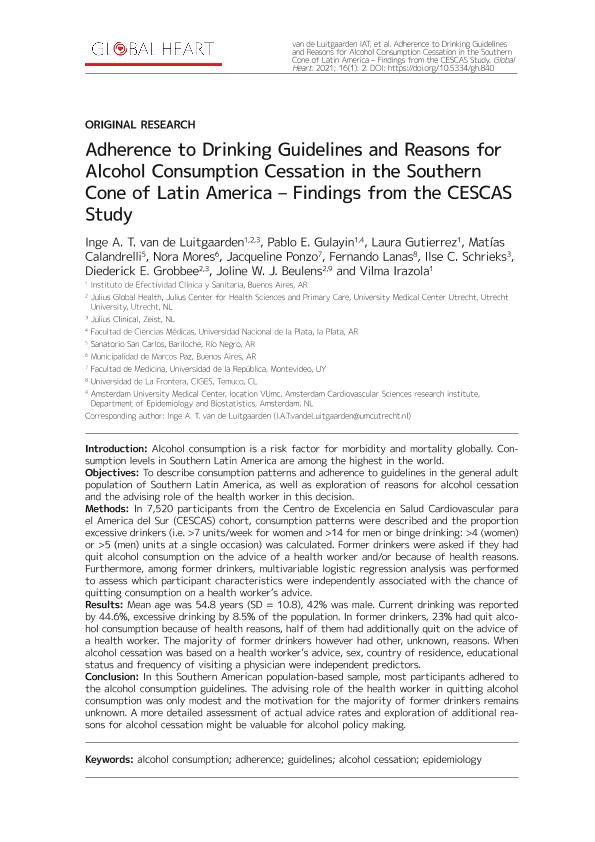Artículo
Adherence to drinking guidelines and reasons for alcohol consumption cessation in the southern cone of latin America – Findings from the CESCAS study
Van de Luitgaarden, Inge A. T.; Gulayin, Pablo Elías; Gutierrez, Laura; Calandrelli, Matías Enrique; Mores, Nora Cecilia; Ponzo, Jacqueline; Lanas, Fernando; Schrieks, Ilse C.; Grobbee, Diederick E.; Beulens, Joline W. J.; Irazola, Vilma

Fecha de publicación:
01/2021
Editorial:
Ubiquity Press
Revista:
Global Heart
ISSN:
2211-8179
Idioma:
Inglés
Tipo de recurso:
Artículo publicado
Clasificación temática:
Resumen
Introduction: Alcohol consumption is a risk factor for morbidity and mortality globally. Consumption levels in Southern Latin America are among the highest in the world. Objectives: To describe consumption patterns and adherence to guidelines in the general adult population of Southern Latin America, as well as exploration of reasons for alcohol cessation and the advising role of the health worker in this decision. Methods: In 7,520 participants from the Centro de Excelencia en Salud Cardiovascular para el America del Sur (CESCAS) cohort, consumption patterns were described and the proportion excessive drinkers (i.e. >7 units/week for women and >14 for men or binge drinking: >4 (women) or >5 (men) units at a single occasion) was calculated. Former drinkers were asked if they had quit alcohol consumption on the advice of a health worker and/or because of health reasons. Furthermore, among former drinkers, multivariable logistic regression analysis was performed to assess which participant characteristics were independently associated with the chance of quitting consumption on a health worker’s advice. Results: Mean age was 54.8 years (SD = 10.8), 42% was male. Current drinking was reported by 44.6%, excessive drinking by 8.5% of the population. In former drinkers, 23% had quit alcohol consumption because of health reasons, half of them had additionally quit on the advice of a health worker. The majority of former drinkers however had other, unknown, reasons. When alcohol cessation was based on a health worker’s advice, sex, country of residence, educational status and frequency of visiting a physician were independent predictors. Conclusion: In this Southern American population-based sample, most participants adhered to the alcohol consumption guidelines. The advising role of the health worker in quitting alcohol consumption was only modest and the motivation for the majority of former drinkers remains unknown. A more detailed assessment of actual advice rates and exploration of additional reasons for alcohol cessation might be valuable for alcohol policy making.
Palabras clave:
ADHERENCE
,
ALCOHOL CESSATION
,
ALCOHOL CONSUMPTION
,
EPIDEMIOLOGY
,
GUIDELINES
Archivos asociados
Licencia
Identificadores
Colecciones
Articulos(CIESP)
Articulos de CENTRO DE INVESTIGACIONES EN EPIDEMIOLOGIA Y SALUD PUBLICA
Articulos de CENTRO DE INVESTIGACIONES EN EPIDEMIOLOGIA Y SALUD PUBLICA
Citación
Van de Luitgaarden, Inge A. T.; Gulayin, Pablo Elías; Gutierrez, Laura; Calandrelli, Matías Enrique; Mores, Nora Cecilia; et al.; Adherence to drinking guidelines and reasons for alcohol consumption cessation in the southern cone of latin America – Findings from the CESCAS study; Ubiquity Press; Global Heart; 16; 1; 1-2021; 1-13
Compartir
Altmétricas



